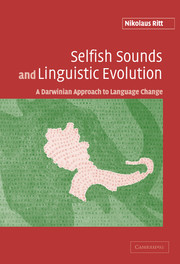Book contents
- Frontmatter
- Contents
- List of figures
- Preface
- 1 Introduction
- 2 The historical perspective
- 3 Approaching ‘language change’
- 4 The Darwinian approach
- 5 Generalising Darwinism
- 6 Towards an evolutionary theory of language
- 7 What does all this imply for the study of language change?
- 8 How to live with feet, if one happens to be a morph-meme
- 9 The prosodic evolution of English word forms or The Great Trochaic Conspiracy
- 10 Conclusion
- References
- Index
3 - Approaching ‘language change’
Published online by Cambridge University Press: 22 September 2009
- Frontmatter
- Contents
- List of figures
- Preface
- 1 Introduction
- 2 The historical perspective
- 3 Approaching ‘language change’
- 4 The Darwinian approach
- 5 Generalising Darwinism
- 6 Towards an evolutionary theory of language
- 7 What does all this imply for the study of language change?
- 8 How to live with feet, if one happens to be a morph-meme
- 9 The prosodic evolution of English word forms or The Great Trochaic Conspiracy
- 10 Conclusion
- References
- Index
Summary
Preliminaries
The words ‘language’ and the compound ‘language change’ are familiar from everyday use. There they carry meanings and associations which work well enough for everyday purposes. In a way, these meanings and associations might be viewed as mostly implicit and rather crude theories, or working hypotheses. All humans who are confronted by language in their daily experience have them. Investigating the nature and mechanics of language and language change, however, is definitely not a typical everyday purpose. Approaching a language as something that changes and has a history is clearly different from approaching language as something that one learns, knows, uses or understands. Since the shape of any theory will reflect the purposes for which it is constructed, it cannot be taken for granted that the normal, everyday way in which we think of languages should prove useful when we intend to understand their historicity. After all, it is obvious that common sense often conceptualises phenomena in a way which can be utterly inadequate for special, and in particular scientific purposes. Take such concepts as sunrise and sunset, to give a trivial but telling example. While they are perfectly adequate for referring to the phenomena as most of us experience them, they are downright deceptive for the purpose of describing or even understanding the celestial mechanics behind the events.
- Type
- Chapter
- Information
- Selfish Sounds and Linguistic EvolutionA Darwinian Approach to Language Change, pp. 19 - 61Publisher: Cambridge University PressPrint publication year: 2004

